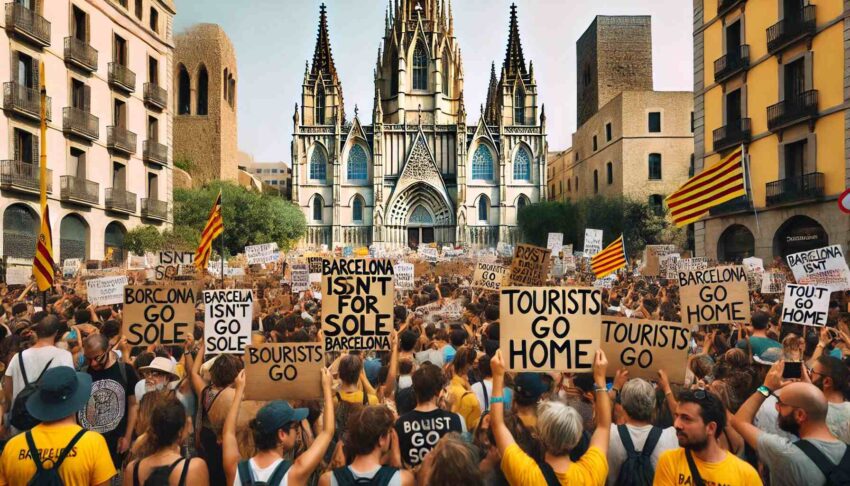Wednesday, July 10, 2024
Reading Time: 4 minutes

In recent months, Barcelona has seen a surge in protests as residents rally against the overwhelming influx of tourists that has increasingly burdened the city. These demonstrations, notably held on significant dates like World Tourism Day, are driven by a community frustrated with rising rent prices, environmental degradation, and the loss of local identity. The protests reflect a broader dissatisfaction with how mass tourism has transformed the city’s landscape and daily life, prompting calls for more sustainable tourism practices and greater regulation of tourist accommodations. As these tensions continue to rise, Barcelona stands at a crossroads, grappling with the need to balance economic benefits with the preservation of its cultural and social fabric
Growing Discontent Among Locals
Residents of Barcelona have taken to the streets to protest against the unchecked growth of mass tourism, highlighting the adverse effects it has on their daily lives and the city’s infrastructure. These demonstrations are part of a larger movement that has been gaining momentum over the past few years, as locals demand more sustainable tourism practices.
The Impact of Mass Tourism
Economic and Social Strain
One of the primary concerns voiced by the protesters is the skyrocketing cost of living, particularly in terms of housing. The influx of tourists has driven up rent prices, making it increasingly difficult for long-term residents to afford living in the city center. This economic strain is compounded by the commodification of urban spaces, where local amenities and resources are often repurposed to cater to tourists rather than residents.
Daniel Pardo, a member of the Neighborhood Assembly for Tourism Decline, stated, “This day is also used by the industry to wash the image of tourism and the impact it has on every level,” referring to World Tourism Day. He highlighted issues such as the housing crisis, climate change, and the overall deterioration of residents’ quality of life.
Environmental Concerns
The environmental impact of mass tourism is another significant issue. Protesters argue that the constant influx of tourists contributes to air pollution, resource depletion, and overall environmental degradation. These issues are particularly pressing in the context of the current climate emergency, where the need for sustainable practices is more critical than ever.
Protests and Demonstrations
World Tourism Day Demonstrations
On World Tourism Day, celebrated on September 27, civil society organizations in Barcelona organized a protest to express their dissatisfaction with the current state of tourism in the city. The demonstration started at the steps of Barcelona’s Cathedral, a symbolic location due to its popularity among tourists. Dozens of locals gathered to voice their concerns, holding signs with slogans such as “Barcelona isn’t for sale” and “Tourist Go Home”.
The protesters then marched towards Carrer del Bisbe, a nearby street, where they temporarily blocked passage to highlight the inconvenience and disruption caused by mass tourism. This act was intended to give passersby a sense of what it feels like to navigate a city overrun by tourists.
Protests in Barceloneta
In another demonstration along Barceloneta beach, around a hundred residents gathered to protest the impact of tourism on their neighborhood. Many of the protesters wore yellow t-shirts with the slogan “Barceloneta isn’t for sale” in Catalan, and carried signs that read “We Don’t Want Tourists In Our Buildings. This Is Not A Beach Resort.” This protest was part of a broader campaign to reclaim public spaces for locals and reduce the commercialization of their neighborhoods.
Government and Community Response
Regulatory Measures
In response to these ongoing issues, Barcelona’s town hall has implemented measures to curb the growth of tourist accommodations, particularly those rented through online platforms like Airbnb. These regulations aim to limit the number of tourist apartments in the city and ensure that residential areas remain affordable and accessible to locals.
Community Initiatives
Local groups and organizations continue to advocate for more sustainable tourism practices. The Neighborhood Assembly for Tourism Decline, for example, is actively involved in organizing protests and raising awareness about the negative impacts of mass tourism. Their efforts are focused on promoting policies that prioritize the well-being of residents and the sustainability of the city’s resources.
Looking Ahead
The Future of Tourism in Barcelona
The protests in Barcelona reflect a growing global movement towards sustainable tourism. As cities around the world grapple with similar issues, there is increasing recognition of the need to balance the economic benefits of tourism with its social and environmental costs. Barcelona’s residents are at the forefront of this movement, demanding changes that will ensure the city remains livable for future generations.
Potential Solutions
Addressing the challenges posed by mass tourism requires a multi-faceted approach. Potential solutions include stricter regulations on tourist accommodations, better management of tourist flows, and increased investment in public infrastructure. By implementing these measures, cities like Barcelona can create a more sustainable and equitable tourism industry that benefits both residents and visitors.
In conclusion, the recent protests in Barcelona underscore the urgent need for a reevaluation of current tourism practices. As residents continue to push for change, their efforts serve as a powerful reminder of the importance of sustainable and community-focused tourism policies.









![Business Travel Statistics [2007-2024]: Market & Trend Data Analysis Business Travel Statistics [2007-2024]: Market & Trend Data Analysis](https://i1.wp.com/travelfreak.com/wp-content/uploads/2024/03/business-travel-statistics.jpg?w=1600&resize=1600,1067&ssl=1)


